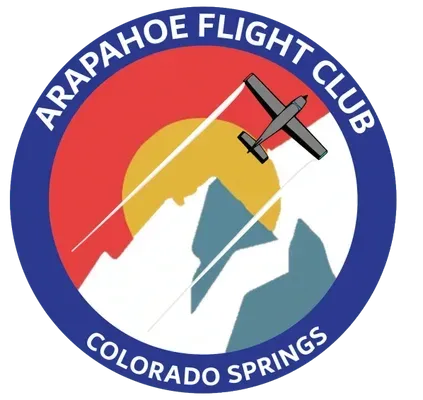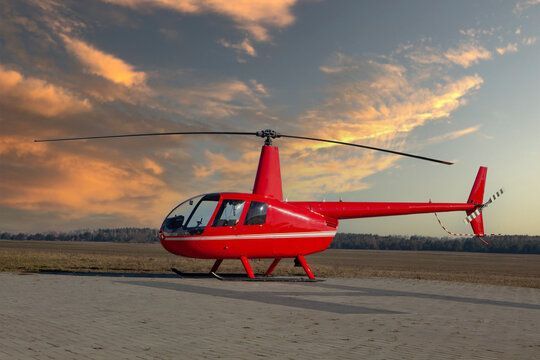Helicopter Pilot Training in Colorado
We offer rotor add on training to fixed wing endorsements as well
Pricing Structure
At Arapahoe Flight Club, we’re excited to introduce our new pricing for helicopter training—designed to be the most competitive in the Colorado Springs area! We understand that the cost of flight training can be a significant burden, which is why we’re proud to offer our
students savings of up to $30,000 compared to our competitors.
How do we achieve these remarkable prices? As a membership organization, we utilize our membership dues to reduce operating costs, allowing us to pass those savings directly to you. Additionally, our in-house maintenance team means we handle all upkeep on our aircraft without the added expense of outsourcing. We also provide maintenance services for outside aircraft, creating additional revenue that further supports our mission of affordable training.
Join us at Arapahoe Flight Club and take the next step in your aviation journey without breaking the bank! Explore our pricing options below and see how we can make your dream of flying a reality!
* Pro Price requires the student to be enrolled in a helicopter training curriculum. Additionally, Pro Price requires that the student flies a minimum of 2 flight hours per week (maintenance, weather, and other circumstances are taken into consideration).
** Elite Price has the same requirements as Pro Price and additionally requires a minimum deposit of $10,000 into the student’s account.
** Withdrawing from a curriculum before all the credit is used will revert all pricing (including previously charged flights) to the regular price, which could result in the student owning money to the AFC.
** Any residual credit will be reimbursed in 4 weeks from the date of formal request.
Introductory Flights
Learn to fly a helicopter with us at Arapahoe Flight Club in Colorado Springs! Do you want to feel what it's like to be behind the controls of a helicopter? Now you can with our introductory helicopter discovery flight, where you will learn the ins and outs of helicopter operation.
Whether you're checking out helicopters as a potential hobby or career, or you are looking for an exciting new gift idea, our helicopter pilot training in Colorado has you covered. We give you the confidence and safety to learn about operating a helicopter in a manageable and straightforward way.
At AFC, we believe in nurturing a passion for flying while maintaining the highest standards of professionalism. Our helicopter pilot training in Colorado will equip you with the technical skills necessary for safe and competent piloting.
Along with expanding your skillset, our training program instills a lifelong appreciation for the art of helicopter flying.
Embark on a personal aviation adventure with Arapahoe Fight Club’s helicopter flight lessons, where passion for flight and professional training converge amid the stunning beauty of Colorado.
By tackling a new hobby with our introductory helicopter lessons, we guarantee you won't be disappointed. As you take to the skies, we'll guide you to fly without fear or hesitation, focusing on making sure each flyer can handle the aircraft effortlessly.
Private Pilot Helicopter
The path towards being a professional helicopter pilot starts with the Private Pilot Certificate (or license).
What are the requirements to be a private helicopter pilot?
- Be at least 17 years of age.
- Read, speak, and understand English.
- Obtain at least a 3rd Class Medical Certificate from an Aviation Medical Examiner. If you are career track, a 1st or 2nd Class is recommended. You can search for an AME in your area on the FAA AME locator page.
- Log at least 40 hours dual instruction in a helicopter.
- Take the written FAA (Federal Aviation Administration) Private Pilot Rotorcraft Helicopter Test - this will happen about halfway through your training.
- Complete your final exam, called a "check ride" which includes an oral and practical (flight) test administered by an FAA Certified Examiner.
A private pilot can exercise certain privileges under FAA regulations. These include recreational or hobby flying, personal business, and for charity. A private pilot can take passengers, but cannot receive any compensation for the flight.
Commercial Pilot Helicopter
The next step towards professional helicopter pilot is commercial training and endorsement.
Upon completion of this helicopter pilot training course, you'll be allowed to fly for hire.
Additional Training Endorsements Available for:
Instrument Rating
Certified Flight Instructor
Instrument Flight Instructor
Most pilots choose to pursue a Certified Flight Instructor (CFI) rating as well as a Certified Flight Instructor Instrument (CFII) rating, which are proficiency based. Our instructors can train you for all of these certificates and ratings. Contact us for details!
FAQ's
Why are helicopters so expensive? Helicopters are highly complex machines. Even a smaller helicopter like those produced by Robinson Helicopters are more complicated to build, maintain, and operate when compared to airplanes of the same size and weight category. That translates to a higher operating cost per hour, which is why you see an hourly rate that is significantly higher than airplanes.
Why the R44's? Isn't there a cheaper alternative? When it comes to helicopter flight training, there are a few models to choose from. The Schweizer 269 (aka S300C) and Robinson R22 are 2-seat, lightweight helicopters that are common for flight training. However, these small machines also have small engines that simply do not have the power available to handle the high altitude environment here at the Colorado Springs airport. The Robinson R44 provides a better performance envelope which translates to safer, more efficient flight training. Here are the top reasons we like the R44:
- More powerful and capable engine for the altitude and temperatures common in Colorado Springs, providing a safer training environment.
- Training at high altitude has several advantages, including better power management and decision-making skills and the ability to log mountain/high altitude time which is valuable for career track students.
- Allows for fellow students to share in the flight training so more than one person can benefit from the flight.
- If you're on the career track, the R44 is widely used in the training, tour, and utility industries. Mastering this aircraft early in your training has future benefits. We can provide you options for gaining experience in the R22 as well.
- Some people are looking to purchase a helicopter for their personal use, and the Robinson R44 is the most popular choice for private owners.
What are the limitations of our helicopters? We operate the Robinson R-44 Raven II, which is the most powerful piston helicopter made by Robinson, and the most popular civilian helicopter in the world. Its fuel injected Lycoming IO-540 engine boasts 245 horsepower, and is rated up to 14,000' density altitude. The R44 can carry up to 2500lb, however our high altitude often restricts us from operating at max gross weight during the summer months. It is certified for day and night VFR flight, and is equipped with the appropriate instruments to operate as a trainer for instrument and CFII ratings under simulated instrument conditions (using a view limiting device).
How do I get a jumpstart on learning before my flight training begins? What do you recommend for ground training? When you start flying with us, you'll receive both a ground and flight training syllabus to guide your study, along with thorough lesson plans that include links to videos and articles. If you enjoy video learning, there are several online subscription resources available, and all have individual certificate/rating courses and career-track bundles.
Subscription based:
- King Schools
- Helicopter Online Ground School (HOGS)
Free YouTube channels:
- Fixed wing/aviation in general: Captain Joe, Fly8MA, MzeroA, passfaaexams.com (Gian Luca Noia)
- Systems: speedkar99 (car mechanic)
- Helicopter specific: Helicopter Lessons in 10 Minutes or Less, Helicopter Online Ground School (they have
some free content), Helicopter Training Videos, some flight schools put out free content as well such as
Leading Edge Flight Academy
In addition, you can purchase the books you'll need for home study. AFC has this package of materials available for purchase, but you can also research and buy your own. Some books are available as pdf downloads if you prefer digital reading. When given the option, choose the books that are in color, not black and white.
What books do I need? Mandatory Book and Materials List:
- Helicopter Flying Handbook
- Pilots Operating Handbook (POH) for the Robinson R44 Raven II
- Pilots Handbook of Aeronautical Knowledge
- FAR/AIM (FAA Regulations Manual) - must have a current version for check ride
Practical Test Standards for your certificate or rating (private, commercial, etc.)
E6B flight computer, plotter, and sectional chart (you'll need these about halfway through private. Some will be available at school for you to borrow.)
Foreflight subscription (you'll need this about halfway through private or at the latest instrument), iPad,
Logbook
Optional Book List:
Private Pilot FAA Written Test Prep
Helicopter Maneuvers Manual
Jeppesen Instrument Commercial Manual (mandatory for Commercial Training)
Oral Exam Guide - Helicopters
Robinson R44 Ultimate Pilots Operating Handbook
Foreflight Subscription (optional for private) and iPad
- available as pdf download
How can I keep flying after I receive my private certificate/rating?
If you plan to stop training after your private certificate or add-on rating, your best bet is to purchase a helicopter. There aren't many rental options out there due to the outrageous insurance and hour requirements. The other option is to continue flying with an instructor on board, which allows you to carry passengers and still meet the requirements of our insurance (because the instructor is acting as PIC).
Do you have career advancement opportunities?
Arapahoe Flight Club's rotorcraft instructors are well connected in helicopter aviation, and are happy to help you start networking toward your goals - you'll find it's a very small world. High quality training, a strong work ethic, a positive attitude, and a solid base of networking are your best friends when it comes to nailing your dream job, and they will carry you further than any job placement program a school can offer.

